Travel Training in NDIS Day Programs: Beyond the Classroom
ndis day programs

For individuals with disabilities, gaining independence is a central goal that supports personal growth and social participation. One of the most empowering ways to achieve this is through travel training—an essential life skill that goes far beyond classroom instruction. In the context of NDIS day programs, travel training equips participants with the knowledge, confidence, and skills needed to navigate their communities safely and independently.
What is Travel Training?
Travel training refers to a structured learning process that teaches individuals how to use public transportation systems, understand timetables, follow travel routes, and manage unexpected situations during a journey. It is a practical skill that promotes autonomy and opens doors to work, education, community engagement, and recreation. For many participants in NDIS day programs, travel training represents a critical step toward living more independently and accessing broader life opportunities.
Why Travel Training Matters in NDIS Day Programs
NDIS day programs are designed to support individuals in building core life skills, developing routines, and participating meaningfully in their communities. Travel training is seamlessly integrated into these programs to ensure that learning occurs in real-world settings. It offers a hands-on approach to developing critical thinking, problem-solving, and decision-making skills. By participating in this type of training, individuals gain practical experience in using buses, trains, and trams—experiences that boost both confidence and competence.
Importantly, travel training also supports safety awareness. Participants learn how to identify safe paths, navigate busy environments, handle money or transport cards, and ask for help when needed. This enhances their personal security while empowering them to manage their daily activities more independently.
Beyond the Classroom: Real-World Learning
Unlike traditional classroom learning, travel training in NDIS day programs emphasizes experiential learning. Participants are not just taught theory—they are guided through real journeys. Starting with short, supervised trips, individuals gradually build their comfort level before progressing to longer and more complex routes. Each session is carefully planned to match the participant’s ability level and personal goals.
The inclusion of real-life situations makes the learning process engaging and memorable. Whether it’s purchasing a ticket, finding the right platform, or reading a digital timetable, participants learn by doing. These experiences foster self-reliance and can significantly reduce the anxiety often associated with unfamiliar travel scenarios.
Building Confidence and Social Connection
Travel training also plays a significant role in enhancing social interaction. As participants move through their communities, they meet new people, engage with transport staff, and learn appropriate social behaviour in public settings. These social skills are just as vital as the technical aspects of travel and help reduce isolation.
NDIS day programs that offer travel training help create an inclusive learning environment where individuals feel supported and encouraged. By mastering the art of travel, participants not only become more independent but also more connected to their communities.
Tailored Training for Individual Needs
One of the strengths of travel training within NDIS day programs is its personalised approach. The training is tailored to suit the goals, capabilities, and preferences of each participant. For some, it might involve learning a single route to a workplace or community centre. For others, it could include more complex travel patterns across multiple modes of transport. This flexibility ensures that everyone can progress at their own pace and feel a sense of achievement.
Conclusion
Travel training is a vital component of NDIS day programs that extends learning beyond the classroom and into the heart of everyday life. It empowers individuals with disabilities to move through their world with greater independence, confidence, and dignity. Through structured, real-world experiences, participants gain more than just travel skills—they gain the freedom to connect, explore, and live with greater purpose. As more people develop these essential abilities, the community as a whole becomes more inclusive, accessible, and enriched.

 PHomecare
PHomecare